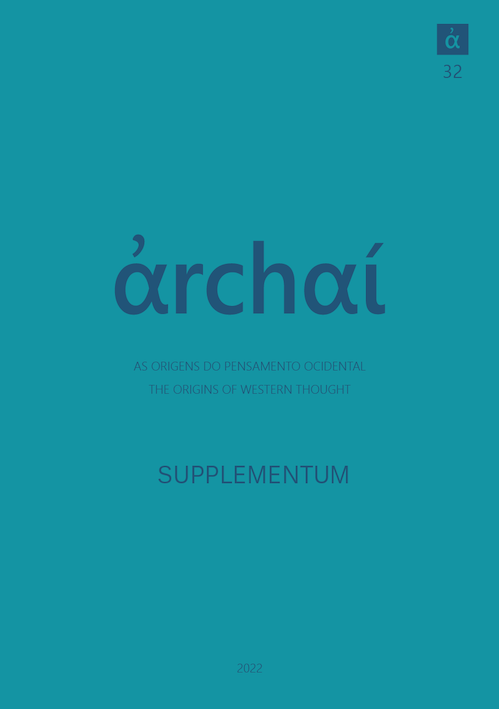Philia as Fellowship in Plato’s Lysis
DOI:
https://doi.org/10.14195/1984-249X_32_40Keywords:
friendship, desire, wisdom, fellowship, associationAbstract
Socrates in the Lysis discusses philia and the conditions under which two or more people can be said to engage in this relationship. Many commentators take Socrates to be attempting to discover how human beings enter into the relationship of friendship, a relationship characterized by reciprocal affection, altruistic concern and personal intimacy. Other readers of the Lysis see in the dialogue’s investigation of philia a discussion of desire and attraction at the most general level. On this view, philia is one species of the general human desire for good. The present paper develops a third reading of philia. Philia is a type of partnership or fellowship where affection and intimacy are not central features of the relationship. The fellowship involves at least one party who possesses wisdom while other members of the fellowship seek to benefit from wisdom. Thus philia is a characteristically human response to the need for wisdom. The members of such a fellowship share a common desire for a good which gives purpose to their association, and because of their common desire to benefit from this good the members can be described as fellows or partners in the pursuit of this good.
Downloads
References
CALHOUN, G. M. (1913). Athenian Clubs in Politics and Litigation. Bulletin of the University of Texas 262, Humanistic Series 14, p. 1-172.
COOPER, J. (ed.) (1997). Plato. Complete Works Indianapolis, Hackett Publishing Company.
FINLEY, M. (1977). The World of Odysseus 2nd edition. London, Chatto and Windus.
GADAMER, H.-G. (1980). Logos and Ergon in Plato’s Lysis In: GADAMER, H.-G. Dialogue and Dialectic SMITH, P. C. (trans). New Haven, Yale University Press, p. 1-20.
GONZALEZ, F. (1995). Plato’s Lysis: An Enactment of Philosophical Kinship. Ancient Philosophy 15, p. 69-90.
HADEN, J. (1983). Friendship in Plato’s Lysis Review of Metaphysics 37, p. 327-56.
HEATH, M. (1987). The Poetics of Greek Tragedy Stanford, Stanford University Press.
HUMPHREYS, S. C. (2004). Public and Private Interests in Classical Athens. In: RHODES, P.J. (ed.). Athenian Democracy Edinburgh, Edinburgh University Press, p. 225-36.
KONSTAN, D. (1997). Friendship in the Classical World New York, Cambridge University Press.
MITCHELL, L. (1997). Greeks Bearing Gifts New York, Cambridge University Press .
NICHOLS, M. (2006) Friendship and Community in Plato’s Lysis Review of Politics 68, p. 1-19.
MILLETT, P. (1991). Lending and Borrowing in Ancient Athens Cambridge, Cambridge University Press.
PAPPAS, N. (1989). Socrates’ Charitable Treatment of Poetry. Philosophy and Literature 13, p. 248-261.
PENNER, T.; ROWE, C. (2005). Plato’s Lysis New York, Cambridge University Press .
RESHOTKO, N. (1997). Plato’s Lysis: A Socratic Treatise on Desire and Attraction. Apeiron 30, p. 1-18.
RHODES, P. J. (1986). Political Activity in Classical Athens. Journal of Hellenic Studies 106, p. 132-144.
TECUŞAN, M. (1990). Patterns of the Irrational in Philosophic Drinking. Plato Outside the Symposium In: MURRAY, O. (ed.). Sympotica: A Symposium on the Symposion Oxford: Oxford University Press. p. 238-260.
TRIVIGNO, F. (2013). Childish Nonsense? The Value of Interpretation in Plato’s Protagoras Journal of the History of Philosophy 51, p. 509-543.
WOLFSDORF, D. (2007). Philia in Plato’s Lysis Harvard Studies in Classical Philology 103, p. 235-259.
Downloads
Published
How to Cite
Issue
Section
License
Copyright (c) 2023 Andrew Payne

This work is licensed under a Creative Commons Attribution 4.0 International License.
Given the public access policy of the journal, the use of the published texts is free, with the obligation of recognizing the original authorship and the first publication in this journal. The authors of the published contributions are entirely and exclusively responsible for their contents.
1. The authors authorize the publication of the article in this journal.
2. The authors guarantee that the contribution is original, and take full responsibility for its content in case of impugnation by third parties.
3. The authors guarantee that the contribution is not under evaluation in another journal.
4. The authors keep the copyright and convey to the journal the right of first publication, the work being licensed under a Creative Commons Attribution License-BY.
5. The authors are allowed and stimulated to publicize and distribute their work on-line after the publication in the journal.
6. The authors of the approved works authorize the journal to distribute their content, after publication, for reproduction in content indexes, virtual libraries and similars.
7. The editors reserve the right to make adjustments to the text and to adequate the article to the editorial rules of the journal.



